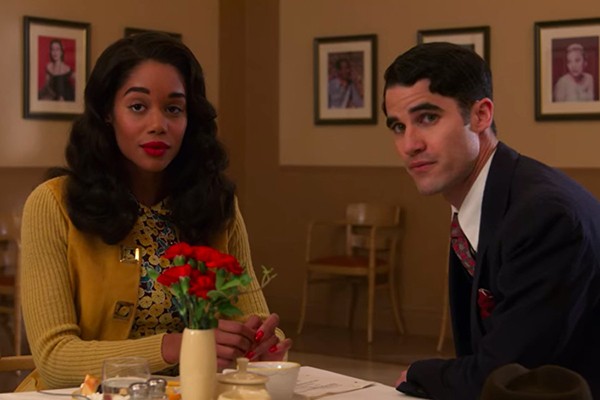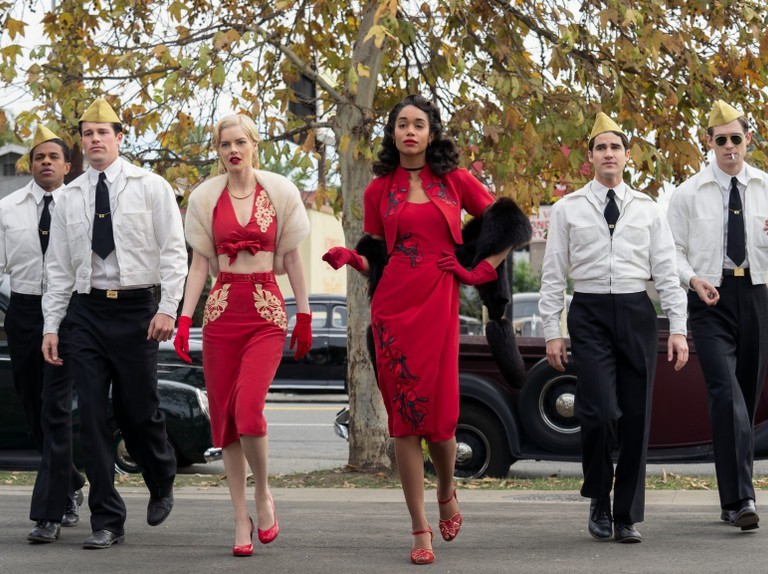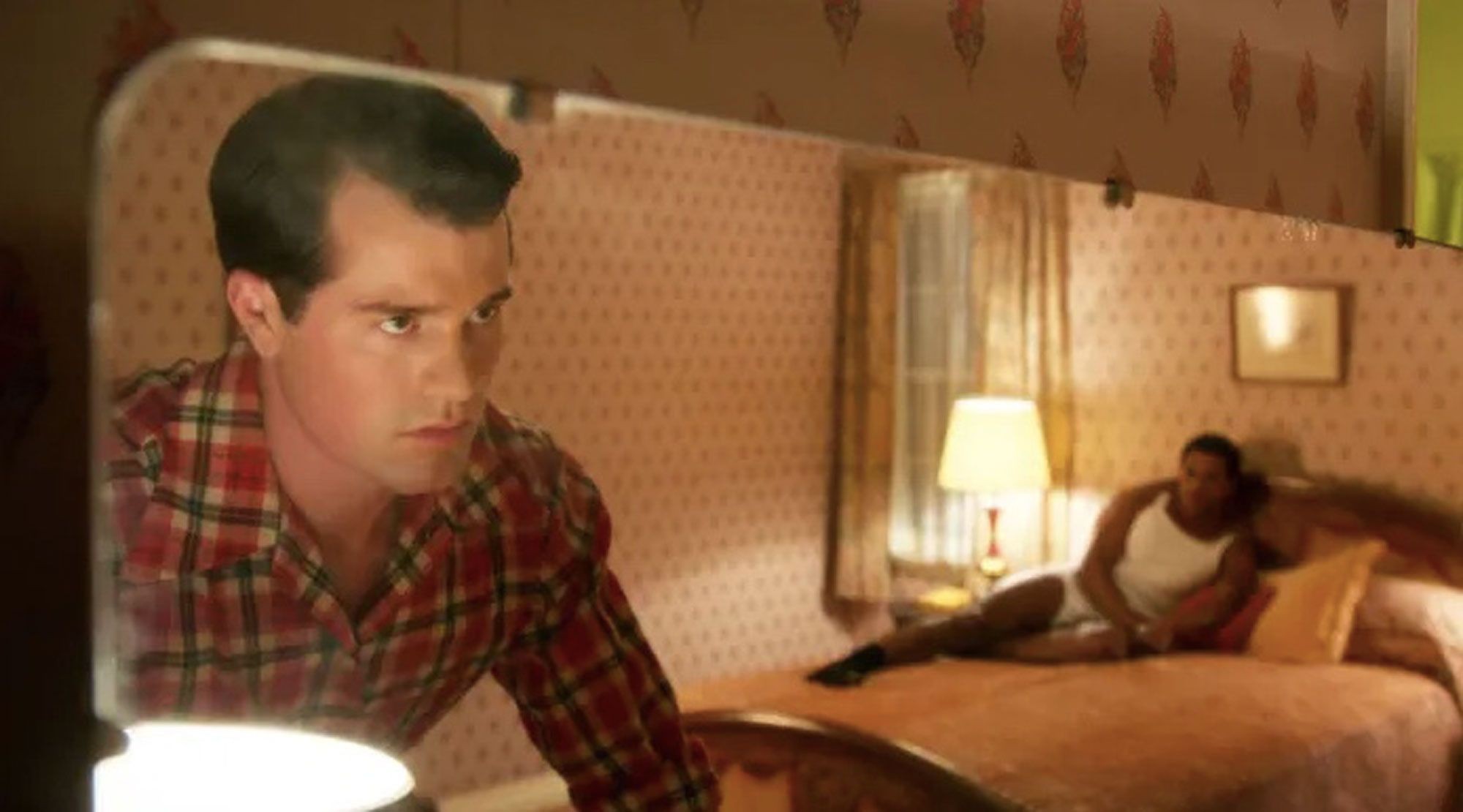The period immediately after World War II was a crucial time in film history. The studio system, which had arisen over the former 30 years, was trying to get back to normal, as its stars, craftspeople, and audience returned home. But the prewar status quo, with the all-powerful studio bosses controlling vast empires of theaters that they fed with a steady output of A and B pictures, was never to return.
In 1948, United States vs. Paramount Pictures forced the studios to sell off their theater chains. Under the Paramount Consent Decree, no longer would Paramount-owned theaters play exclusively Paramount pictures. The power of the studio bosses began to wane, setting the stage for a new era of agents, managers, independent contractors, and upstart indie producers that shaped Hollywood as we know it today.
The films, too, took on a darker tone.

Laura Harrier (left) and Darren Criss are outrageously good looking
President Franklin D. Roosevelt had agreed not to pursue the anti-trust action against the studios in exchange for the bosses agreeing to produce wartime propaganda for the government. With the war finished, rah rah military films such as Thirty Seconds Over Tokyo (written by noted socialist Dalton Trumbo) gave way to the darker meditations such as It’s a Wonderful Life and The Best Years of Our Lives. Hardboiled crime pictures that French critics would later tie together as film noir became incredibly popular. If the dominant mood of the war years was “We’re all in this together!” noir saw capitalist America as a war of all against all.
Tinseltown in turmoil seems like ripe pickings for story material. That’s the promise of Ryan Murphy’s new Netflix miniseries Hollywood. Taking some of the old Hollywood Babylon legends of sex, corruption, and debauchery out for a thinly fictionalized spin could make for some quality kicks. Especially the sex part. This is Hollywood, after all. Everyone’s ridiculously good looking. In the right hands, a figure like the deeply closeted heartthrob Rock Hudson seems like perfect fodder for post-Empire soapy drama.

Jeremy Pope, Samara Weaving, Laura Harrier, Darren Criss, and David Corenswet
Hollywood starts promisingly enough. Jack Costello (David Corenswet) is one of thousands of former G.I.s who, we are told in the opening newsreel sequence, flocked to Southern California to seek their fortunes. His wife Henrietta (Maude Apatow) is pregnant, and the meager work Jack is getting as an extra just isn’t cutting it. While drowning his sorrows at a Hollywood watering hole, Jack meets Ernie West (Dylan McDermott) who offers him a job as a gas station attendant to help make ends meet.
Once he puts on the garrison cap and starts to fill tanks, Jack finds out the real nature of Ernie’s business. The gas station is a front for a high-end prostitution ring, and Jack is expected to service the oversexed daughters of the rich. The money is excellent, and Jack has few qualms about becoming a himbo for the likes of Avis Amberg (Patti LuPone), whose husband runs Ace Studios. But his gigolo days come to a premature end when he refuses to schtupp Cole Porter in a trailer behind the gas station. “If you won’t go have some fun with national treasure Cole Porter, you’d better find me someone who can!” fumes Ernie.

Jake Picking (left) as Roy Fitzgerald, aka Rock Hudson.
Jack dresses as a cop and dragoons Archie Coleman (Jeremy Pope), a black, gay screenwriter reduced to turning tricks in stag houses, into service at the gas station. Archie is a hinge for Hollywood‘s action. He has written a screenplay called Peg, about an actress who committed suicide by jumping off the Hollywood sign. His film attracts the interest of Raymond Ainsley (Darren Criss), a director under contract at Ace. Through the service station, Archie meets a young actor named Roy Fitzgerald. Their clandestine relationship starts to bloom just as Roy is taken in by agent Henry Wilson (Jim Parsons of The Big Bang Theory, sleazier than you ever thought possible). Wilson insists on changing Roy’s name to something more manly, like Rock Hudson (Jake Picking), then takes advantage of him on the casting couch.
Sexual exploitation is the order of the day in Hollywood, and at least that feels pretty authentic. But for all the sleaze and the betrayal, Hollywood feels kinda lifeless and sterile. Part of the problem lies with the leads. Murphy has a type: dark-haired guys with giant, square jaws. Corenswet, Criss, and Picking all fit the description, and the recurring joke of actors being picked more for their looks than their acting ability seems to apply to the show itself. A story with this much fornication set in the underbelly of dreamland needs to be more fun.
Hollywood is streaming on Netflix.
Netflix’s Hollywood is a Revisionist Romp Through Tinseltown History